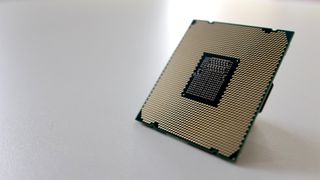Intel accidentally leaks its own Raptor Lake CPUs
Flagship spec spilled, and more besides, on Intel’s site

Intel’s Raptor Lake processors have been leaked by the company itself, showing the flagship CPU and two others complete with what can be assumed to be final core counts and max boost speeds.
This appears to be a mistaken update to an official Intel guide on choosing the right gaming CPU, and in one section of the article for the company’s Canadian site, the spec of three 12th-gen (current Alder Lake) models is discussed. Except the accidental update to the page inserted a trio of incoming Raptor Lake models instead, namely the Core i5-13600K, Core i7-13700K and flagship Core i9-13900K.
The error was rectified, and the page has been reverted to show the Alder Lake chips, but not before hardware leaker @momomo_us screen grabbed the details (as flagged by VideoCardz).
🫣https://t.co/7z1wtR65P9 pic.twitter.com/nlw3FfhVwISeptember 12, 2022
As you can see, the 13900K is shown with 24 cores and 32 threads, and a maximum boost clock of 5.4GHz for the performance cores. That means as rumored, it’s a chip with 8 performance cores and 16 efficiency cores (the latter don’t have hyper-threading, hence the 32 threads).
The 13700K is listed as having 16 cores and 24 threads – so 8 performance cores, and 8 efficiency ones – with a top boost of 5.3GHz (for the performance cores). And the 13600K offers 14 cores and 20 threads – meaning 6 performance cores, and 8 efficiency – with a max boost of up to 5.1GHz.
All of this comes with the caveat that this mistaken spec update could have errors in it, or at least that’s a possibility, albeit not a likely one we’d hope.
Analysis: Bigger boost speeds are still in the cards
Jumping the gun with a page update like this suggests that the supposedly imminent launch of Raptor Lake – which is thought to be happening at Intel’s Innovation event on September 27, just two weeks away now – is indeed going ahead as rumored. Because if Intel is getting updates such as this ready and in place for its website now, the reveal is likely coming soon enough. (The chips won’t go on sale until later, mind you, if the grapevine is right – maybe around mid-October or slightly later).
Get daily insight, inspiration and deals in your inbox
Get the hottest deals available in your inbox plus news, reviews, opinion, analysis and more from the TechRadar team.
This also kind of confirms – salt added as ever – that among the first CPUs we’ll see are the trio of the 13900K, 13700K and 13600K, which is expected, of course, as they represent the flagship and main workhorses of the 13th-gen range. Note that there may well be more Raptor Lake processors to kick off the next-gen action – in fact, that’s highly likely – and rumors point to 12 consumer models initially (six, really, seeing as half will simply be ‘F’ variants which are the same as the standard CPU, just without the integrated graphics).
If you’re disappointed by the boost speeds shown in this leak, note that they are the base max Turbo clock frequency, and the 13900K, for example, can go higher than 5.4GHz. The more widely (and long) rumored 5.8GHz is the real top speed, but that only happens with TVB (for a brief burst of time, in other words, while thermals allow).
So don’t go thinking the rumor mill has well overestimated boost speeds, because as far as the latest leaks show, the flagship will hit 5.8GHz, and this spillage from Intel doesn’t contradict that. (It’s worth noting that this also tells us that Intel’s revelation that a Raptor Lake CPU will hit 6GHz out of the box pertains to the 13900KS, which will be a later special edition of the 13900K).
All that said, we have seen speculation of an all-core boost speed of 5.5GHz for the 13900K, and this official – well, still semi-official technically – figure of 5.4GHz seemingly puts paid to that idea.
That in no way lowers expectations of the kind of performance we’ll see from Raptor Lake, mind, and effectively illustrates why rumor mongering always needs to be regarded with a great deal of caution. Of course, even this leak needs to be treated somewhat carefully, as we’ve touched upon.
However, the general vibe from recent Raptor Lake rumors is setting up some pretty positive expectations, performance-wise – and particularly for the 13th-gen being a much better prospect for overclocking than Alder Lake. PC enthusiasts, then, will be keen to see these processors go on sale, no doubt, although next-gen Ryzen 7000 CPUs (Zen 4) from AMD are also building up similar expectations as a robust step on – in terms of overall performance, not overclocking – compared to current Zen 3-based chips.
Darren is a freelancer writing news and features for TechRadar (and occasionally T3) across a broad range of computing topics including CPUs, GPUs, various other hardware, VPNs, antivirus and more. He has written about tech for the best part of three decades, and writes books in his spare time (his debut novel - 'I Know What You Did Last Supper' - was published by Hachette UK in 2013).
Most Popular



